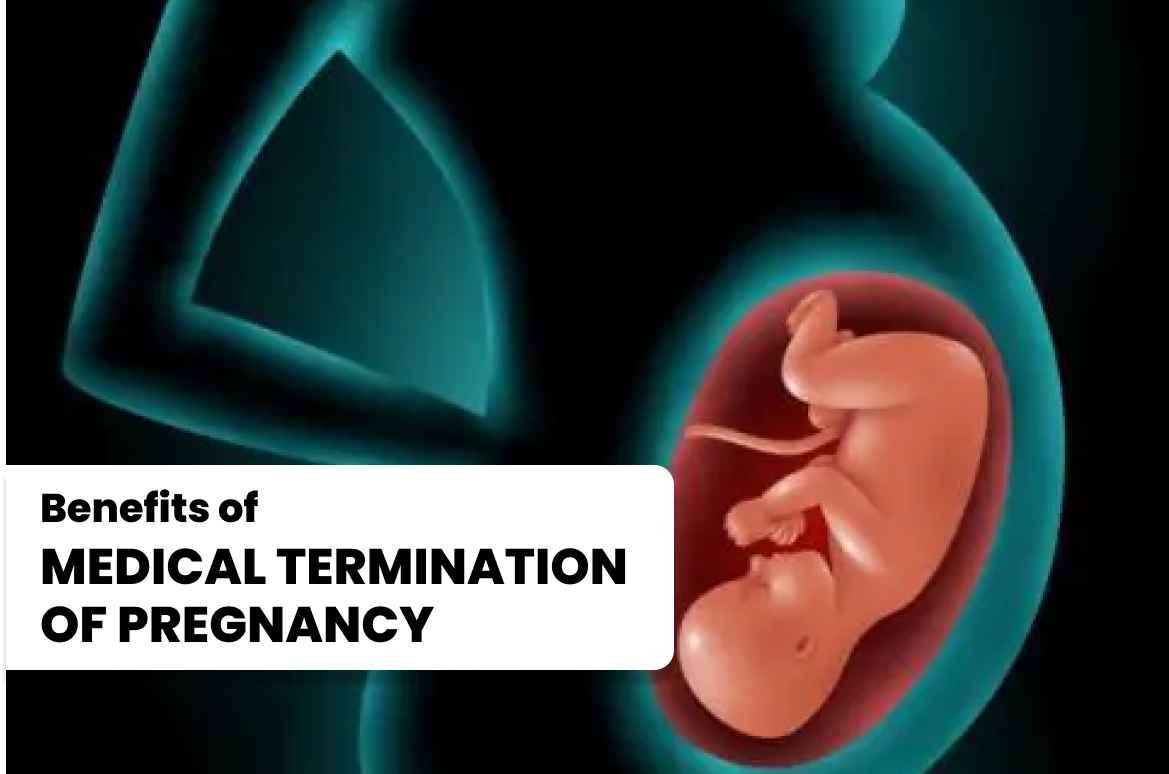It is important to note that medical termination of pregnancy is typically recommended for pregnancies within a specific gestational age range, usually up to around 10 weeks, although the specific cutoff may vary. Beyond that, a surgical abortion procedure may be necessary. Call us to book a appointment with the best Obstetrician-Gynecologists (OB-GYNs) near you.
Medical termination of pregnancy, commonly known as a medical abortion or abortion pill, is a non-surgical procedure used to terminate early pregnancy. It involves the use of medications to induce the expulsion of the embryo or fetus. As with any medical procedure, there are both risks and benefits associated with medical termination of pregnancy.
Abortion by pill involves the use of medications to induce a miscarriage and end a pregnancy. It is typically performed during the early stages of pregnancy, up to 10 weeks gestation. The process involves two medications taken in sequence, as prescribed by a healthcare professional.
Non-invasive Procedure: Medical termination of early pregnancy offers a non-invasive alternative to surgical abortion. It does not require anesthesia or surgical instruments, making it a less physically intrusive option for women seeking to end an early pregnancy. Early Pregnancy Termination: Medical abortion is most effective during the early stages of pregnancy, typically up to 10 weeks gestation. It allows women to terminate the pregnancy at an earlier stage, which may be preferable for personal, emotional, or health-related reasons. Privacy and Convenience: The ability to undergo medical termination of pregnancy in the privacy of one's home is often cited as a significant advantage. Many women appreciate the option to have more control over the process and the ability to experience the termination in a familiar and comfortable environment. Lower Risk of Complications: Compared to surgical abortion, medical termination of pregnancy is generally associated with a lower risk of immediate complications, such as infection or damage to the uterus or cervix. This is particularly relevant for women with certain medical conditions or those who prefer a less invasive procedure.

Non-invasive Procedure: Medical termination of early pregnancy offers a non-invasive alternative to surgical abortion. It does not require anesthesia or surgical instruments, making it a less physically intrusive option for women seeking to end an early pregnancy. Early Pregnancy Termination: Medical abortion is most effective during the early stages of pregnancy, typically up to 10 weeks gestation. It allows women to terminate the pregnancy at an earlier stage, which may be preferable for personal, emotional, or health-related reasons. Privacy and Convenience: The ability to undergo medical termination of pregnancy in the privacy of one's home is often cited as a significant advantage. Many women appreciate the option to have more control over the process and the ability to experience the termination in a familiar and comfortable environment. Lower Risk of Complications: Compared to surgical abortion, medical termination of pregnancy is generally associated with a lower risk of immediate complications, such as infection or damage to the uterus or cervix. This is particularly relevant for women with certain medical conditions or those who prefer a less invasive procedure.
Incomplete Abortion: In some cases, the medical abortion process may not successfully terminate the pregnancy, resulting in an incomplete abortion. This may require additional medical intervention or a follow-up surgical procedure to complete the termination. Heavy Bleeding: While bleeding is a normal part of the medical abortion process, there is a risk of excessive or prolonged bleeding. This can occur in a small percentage of cases and may require medical attention to address any complications. Pain and Discomfort: Cramping and abdominal pain are common side effects of medical abortion. While these symptoms are usually manageable with pain medications, some women may experience more intense or prolonged discomfort. Emotional Impact: The decision to terminate a pregnancy can be emotionally challenging for many women. It is essential to consider the potential psychological impact and seek appropriate support from healthcare providers, counselors, or support groups. Incomplete Information: It is crucial for women considering medical termination of pregnancy to receive accurate and comprehensive information about the procedure, potential risks, and available resources. Adequate counseling and access to professional medical guidance are essential to ensure informed decision-making.

Incomplete Abortion: In some cases, the medical abortion process may not successfully terminate the pregnancy, resulting in an incomplete abortion. This may require additional medical intervention or a follow-up surgical procedure to complete the termination.
Heavy Bleeding: While bleeding is a normal part of the medical abortion process, there is a risk of excessive or prolonged bleeding. This can occur in a small percentage of cases and may require medical attention to address any complications.
Pain and Discomfort: Cramping and abdominal pain are common side effects of medical abortion. While these symptoms are usually manageable with pain medications, some women may experience more intense or prolonged discomfort.
Emotional Impact: The decision to terminate a pregnancy can be emotionally challenging for many women. It is essential to consider the potential psychological impact and seek appropriate support from healthcare providers, counselors, or support groups.
Incomplete Information: It is crucial for women considering medical termination of pregnancy to receive accurate and comprehensive information about the procedure, potential risks, and available resources. Adequate counseling and access to professional medical guidance are essential to ensure informed decision-making.
Abortion by pill involves the use of medications to induce a miscarriage and end a pregnancy. It is typically performed during the early stages of pregnancy, up to 10 weeks gestation. The process involves two medications taken in sequence, as prescribed by a healthcare professional.
The Process of Medical Termination: The Process of Abortion by Pill:
The medicine, mifepristone to terminate pregnancy(commonly known as the pregnancy abortion pill or RU-486), is usually administered at a healthcare provider's office or clinic. This medication works by blocking the hormone progesterone, which is necessary for maintaining pregnancy. By inhibiting progesterone, the medication causes the lining of the uterus to thin and prevents the embryo from developing further.
Approximately 24 to 48 hours later, the second medication, misoprostol, is taken either at the healthcare facility or at home, depending on the healthcare provider's instructions. Misoprostol causes uterine contractions, leading to the expulsion of the embryo and the uterine lining. The process typically resembles a heavy menstrual period and can last several hours.
Is Medical Termination of Pregnancy Safe?
Medical termination of pregnancy is considered a safe and effective method when performed within the recommended gestational age. It is crucial to follow the guidance of a healthcare professional and adhere to the prescribed dosage and instructions.
Complications associated with medical termination of pregnancy are relatively rare but can include excessive bleeding, incomplete abortion, or the need for a surgical intervention if the termination is not successful. It is essential to seek medical attention promptly if any concerning symptoms or complications arise.
Safety and Effectiveness
When performed within the recommended timeframe, medical termination of pregnancy is a safe and effective method with a success rate of over 95%. The effectiveness of the procedure depends on various factors, including the gestational age and individual circumstances.

Abortion by pill involves the use of medications to induce a miscarriage and end a pregnancy. It is typically performed during the early stages of pregnancy, up to 10 weeks gestation. The process involves two medications taken in sequence, as prescribed by a healthcare professional.
The Process of Medical Termination:
The Process of Abortion by Pill:
The medicine, mifepristone to terminate pregnancy(commonly known as the pregnancy abortion pill or RU-486), is usually administered at a healthcare provider's office or clinic. This medication works by blocking the hormone progesterone, which is necessary for maintaining pregnancy. By inhibiting progesterone, the medication causes the lining of the uterus to thin and prevents the embryo from developing further.
Approximately 24 to 48 hours later, the second medication, misoprostol, is taken either at the healthcare facility or at home, depending on the healthcare provider's instructions. Misoprostol causes uterine contractions, leading to the expulsion of the embryo and the uterine lining. The process typically resembles a heavy menstrual period and can last several hours.
Is Medical Termination of Pregnancy Safe?
Medical termination of pregnancy is considered a safe and effective method when performed within the recommended gestational age. It is crucial to follow the guidance of a healthcare professional and adhere to the prescribed dosage and instructions.
Complications associated with medical termination of pregnancy are relatively rare but can include excessive bleeding, incomplete abortion, or the need for a surgical intervention if the termination is not successful. It is essential to seek medical attention promptly if any concerning symptoms or complications arise.
Safety and Effectiveness
When performed within the recommended timeframe, medical termination of pregnancy is a safe and effective method with a success rate of over 95%. The effectiveness of the procedure depends on various factors, including the gestational age and individual circumstances.
After undergoing a medical abortion, it is important to take care of yourself and allow your body to heal. The recovery process can vary from person to person, but there are some general guidelines and considerations to keep in mind. In this article, we will discuss what to expect after a medical abortion and provide some aftercare recommendations.
Physical Recovery: Bleeding: It is normal to experience bleeding and spotting for several days or even weeks after a medical abortion. The bleeding may be similar to a heavy menstrual period and can vary in intensity. It is important to use sanitary pads instead of tampons to reduce the risk of infection. Cramping: Cramping is also common after a medical abortion. Over-the-counter pain relievers, such as ibuprofen, can help manage discomfort. Applying a heating pad or hot water bottle to your lower abdomen may also provide relief. Rest and Recovery: Give yourself time to rest and recover after the procedure. Avoid strenuous activities and exercise for a few days to allow your body to heal. Follow-up Appointment: It is essential to attend a follow-up appointment with your healthcare provider as scheduled. This visit is crucial to ensure that the abortion was successful and to address any concerns or questions you may have.
Emotional Well-being: Emotional Support: Going through a medical abortion can be an emotional experience. It is important to have a support system in place, whether it is friends, family, or a healthcare professional. Reach out to people you trust and consider seeking counseling or support groups if needed. Feelings of Grief or Relief: It is common to experience a range of emotions after a medical abortion, including grief, relief, guilt, or sadness. Remember that everyone's emotional journey is different, and it is important to be kind to yourself and allow yourself to process your feelings at your own pace. Contraception: Discuss contraception options with your healthcare provider to prevent future unintended pregnancies. They can help you choose a method that suits your needs and provide guidance on when it is safe to resume sexual activity. Future Pregnancy: A medical abortion does not typically affect future fertility. However, it is recommended to wait until you have had at least one normal menstrual cycle before attempting to conceive again. This allows your body to fully recover.
Warning Signs: While some discomfort and bleeding are expected after a medical abortion, it is important to be aware of warning signs that may indicate a complication. Seek immediate medical attention if you experience: Severe or persistent abdominal pain Heavy bleeding (soaking more than two sanitary pads per hour) Foul-smelling vaginal discharge Fever or chills Signs of infection or allergic reaction

After undergoing a medical abortion, it is important to take care of yourself and allow your body to heal. The recovery process can vary from person to person, but there are some general guidelines and considerations to keep in mind. In this article, we will discuss what to expect after a medical abortion and provide some aftercare recommendations.
Physical Recovery:
Bleeding: It is normal to experience bleeding and spotting for several days or even weeks after a medical abortion. The bleeding may be similar to a heavy menstrual period and can vary in intensity. It is important to use sanitary pads instead of tampons to reduce the risk of infection.
Cramping: Cramping is also common after a medical abortion. Over-the-counter pain relievers, such as ibuprofen, can help manage discomfort. Applying a heating pad or hot water bottle to your lower abdomen may also provide relief.
Rest and Recovery: Give yourself time to rest and recover after the procedure. Avoid strenuous activities and exercise for a few days to allow your body to heal.
Follow-up Appointment: It is essential to attend a follow-up appointment with your healthcare provider as scheduled. This visit is crucial to ensure that the abortion was successful and to address any concerns or questions you may have.
Emotional Well-being:
Emotional Support: Going through a medical abortion can be an emotional experience. It is important to have a support system in place, whether it is friends, family, or a healthcare professional. Reach out to people you trust and consider seeking counseling or support groups if needed.
Feelings of Grief or Relief: It is common to experience a range of emotions after a medical abortion, including grief, relief, guilt, or sadness. Remember that everyone's emotional journey is different, and it is important to be kind to yourself and allow yourself to process your feelings at your own pace.
Contraception: Discuss contraception options with your healthcare provider to prevent future unintended pregnancies. They can help you choose a method that suits your needs and provide guidance on when it is safe to resume sexual activity.
Future Pregnancy: A medical abortion does not typically affect future fertility. However, it is recommended to wait until you have had at least one normal menstrual cycle before attempting to conceive again. This allows your body to fully recover.
Warning Signs:
While some discomfort and bleeding are expected after a medical abortion, it is important to be aware of warning signs that may indicate a complication. Seek immediate medical attention if you experience:
Severe or persistent abdominal pain
Heavy bleeding (soaking more than two sanitary pads per hour)
Foul-smelling vaginal discharge
Fever or chills
Signs of infection or allergic reaction
Please Wait..